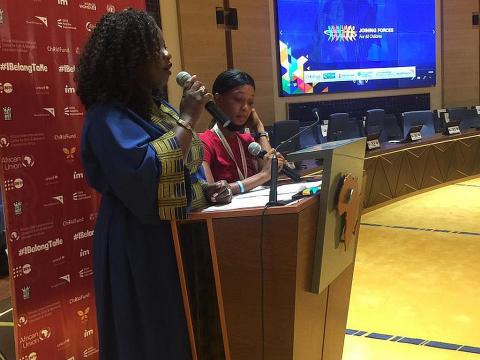By Alpha Abu
Girls from SOS Children’s Village in Sierra Leone joined other girls from across Africa in the Nigerien capital, Niamey for three days of deliberations on ways to eliminate harmful traditional practices.
The event which was organised by the African Union took place at the Mahatma Ghandi Conference Centre from the 16th -18th November, 2021.
Known as the African Girls’ Summit, the event was also streamed live and attracted a larger audience across the continent.
Discussions at the summit focused on forced marriages, early pregnancies, school drop-out and other harmful practices that deny girls the opportunity to make choices that could better their lives.
Two girls from SOS Villages Sierra Leone, Ya Salamatu Kamara and Sallay Conteh, accompanied by the National Director, Sophie Ndong and a Youth Supervisor, Bernadette Mallah discussed with other participants those issues affecting girls in the continent.
According to a Press Release by the children’s organisation, the final day of the summit on Thursday 18 November 2021, SOS Children’s Villages co-organised two parallel sessions that created the platform for the young participants to discuss key issues namely: “Young people engaging with member states on Action and Accountability to end harmful practices”, and “Intervening in Humanitarian, Emergency,Cross-border and Conflict Contexts to prevent and eliminate harmful practices”.
Prior to the summit, a convergence of young people named “West African Girls” from Sierra Leone, Burkina Faso , Togo, Liberia, Chad,Mauritania, Nigeria, Senegal, Benin, Ghana,Niger and Mali, later drew up a manisfesto that urged Leaders to Act Now. They then put together series of recommendations that included the harmonization of all laws so that child marriage is set at 18 years in all countries in Africa, and for Female Genital Mutilation (FGM) and Child Marriage issues be included in the School Curricular. They also called for more protection of homeless girls by NGOs, the recruitment of more social workers by Governments, building of more schools in rural areas so girls can remain in learning institutions, and for an increase in funding for community sensitisation. It was also solicited that Governments promote the creation of counselling and reporting centers and “create awareness about the reporting and referral mechanisms available to girls” so they would be able to “denounce the practices they are subjected to”.
The SOS’ release says girls worldwide are disproportionately affected by harmful practices and drew reference to UNICEF’s estimation that: “some 650 million girls and women worldwide have been married as children, and more than 200 million have undergone female genital mutilation”.
It was also noted that: “Girls without parental care or at risk of losing it are particularly exposed because they lack the protection and support network usually provided by the family. In addition, the advent of the Covid-19 pandemic, humanitarian crises and conflicts have increased the vulnerability of families and children, especially girls, and weakened the gains made in terms of sexual and gender-based violence”.
Copyright © Politico Online 17/11/21








